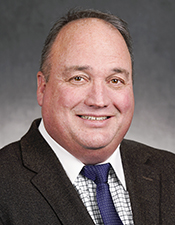As green burial movement grows, state officials consider whether to sanction human composting
Arranging for your body to compost organically upon death could be a thing of the future in Minnesota.
Sponsored by Rep. John Huot (DFL-Rosemount), HF2669 would allow the Department of Health to begin licensing and regulating “natural organic reduction” facilities.
The House Health Finance and Policy Committee laid the bill over, as amended, Tuesday for possible inclusion in a larger bill.
As part of a growing green burial movement, human composting has a lower carbon footprint than cremation. Washington was the first state to legalize human composting in 2020.
“It’s another option for families,” Huot said.
Natural organic reduction facilities place human remains in a closed vessel with other organic materials such as straw and wood chips. Once the matter decomposes, the resultant soil is processed and placed in a container for final disposition.
Under the bill, facilities would be required to develop procedures for identifying a human body from the time of receipt until the remains are released to an authorized party. Facilities would be mandated to place an identifying disk, tab, or other permanent label, within the container after natural organic reduction and before releasing the remains. The disk, tab, or label would correspond to an identification number for the deceased.
Facilities would not be allowed to reduce more than one dead body at the same time in the same reduction vessel, or subsequently introduce a second dead body into the same vessel until it has been properly cleaned. Incidental, unavoidable residue in the vessel would not be considered a violation, however.
“All of this is grounded in science,” said Erik Halaas, a fellow with the FINNOVATION Fellowship Program who has been studying human composting.
Not everyone supports the bill.
“The main experience with composting for most of us is related to household waste, such as eggshells and food scraps. ... Disposing of human bodies in this way goes against our common and innate human desire to respect the dead. A human body is not household waste and should not be treated as such,” wrote Sam Nelson, outside counsel for the Minnesota Catholic Conference.
Representing the Minnesota Funeral Directors Association, Judy Cook said lawmakers should consider the dignity of the deceased as well as public health safety. She noted that the reduction process would not kill certain pathogens such as E. coli.
Related Articles
Search Session Daily
Advanced Search OptionsPriority Dailies
Speaker Emerita Melissa Hortman, husband killed in attack
By HPIS Staff House Speaker Emerita Melissa Hortman (DFL-Brooklyn Park) and her husband, Mark, were fatally shot in their home early Saturday morning.
Gov. Tim Walz announced the news dur...
House Speaker Emerita Melissa Hortman (DFL-Brooklyn Park) and her husband, Mark, were fatally shot in their home early Saturday morning.
Gov. Tim Walz announced the news dur...
Lawmakers deliver budget bills to governor's desk in one-day special session
By Mike Cook About that talk of needing all 21 hours left in a legislative day to complete a special session?
House members were more than up to the challenge Monday. Beginning at 10 a.m...
About that talk of needing all 21 hours left in a legislative day to complete a special session?
House members were more than up to the challenge Monday. Beginning at 10 a.m...
